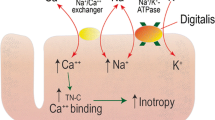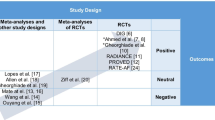Summary
Taking a careful look at each of the outcomes measured in randomized, controlied trials of digoxin suggest that discrepancies in results may be more apparent than real. Digoxin does work, but clinically important benefit is restricted to a relatively small proportion of congestive heart failure (CHF) patients. The play of chance, the dose of digozin used, and the severity of heart failure in patients enrolled in the studies are other factors that may explain the variability in results that were observed. A systematic examination of the sort undertaken here is likely to help resolve apparent difference in outcomes of clinical trials of new (and old) therapies in CHF patients.
Similar content being viewed by others
References
Marantz, PR, Alderman, MH, Tobin, JN. Diagnostic heterogeneity in clinical trials for congestive heart failure. Ann Inter Med 1988;109:55–61.
Guyatt, GH. Methodologic problems in clinical trials in heart failure. J Chron Dis 1985;38:353–359.
The Captopril-Digoxin Multicentre Research Group. Comparative effects of therapy with captopril and digoxin in patients with mild to moderate heart failure. JAMA 1988;259:539–544.
Guyatt, GH, Sullivan, MJJ, Fallen, E, et al., A controlled trial of digoxin in congestive heart fallure. Am J Cardiol 1988;61:371–375.
Taggart, AJ, Johnston, GD, McDevitt, DG. Digoxin with-drawal after cardiac failure in patients with sinus rhythm. J Cardiovas Pharmacol 1983;5:229–34.
Franciosa, JA, Jordan, RA, Wilen, MM, Leddy, CL. Minoxidil in patients with chronic left heart failure: Contrasting hemodynamic and clinical effects in a controlled trial. Circulation 1984;70:63–68.
Kirshner, B, Guyatt, GH. A methodologic-framework for assessing health indices. J Chron Dis 1985;38:27–36.
Guyatt, GH, Bombardier, C, Tugwell, PX. Measuring disease-specific quality of life in clinical trials. Can Med Assoc J 1986;134:889–895.
Lee, DC, Johnson, RA, Bingham, JB, et al. Heart failure in outpatients. N Engl J Med 1982;306:699–705.
Flog, JL, Gottlieb, SH, Lakatta. Is digoxin really important in treatment of compensated heart failure? Am J Med 1982; 73:244–250.
The German and Austrian Xamoterol Study Group. Doubleblind placebo-controlled comparison of digoxin and xamoterol in chronic heart failure. Lancet 1988;489–493.
Meister, W, Schuehlen, H, Scheininger, M, Theisen, K, Low versus medium dosage digoxin therapy in patients with heart failure. In: Erdman, E, Greeff, K, Skou, JC (eds)., Cardiac Glycosides 1785–1985: Steinkopff Verlag, Darmstadt, 1986.
Author information
Authors and Affiliations
Additional information
Dr. Guyatt is a Career Scientist of the Ontario Ministry of Health. This work was supported in part by the Ontario Ministry of Health.
Rights and permissions
About this article
Cite this article
Jaeschke, R., Guyatt, G.H. Why different trials on digitalis give conflicting data. Cardiovasc Drug Ther 2, 727–731 (1989). https://doi.org/10.1007/BF00133200
Issue Date:
DOI: https://doi.org/10.1007/BF00133200




